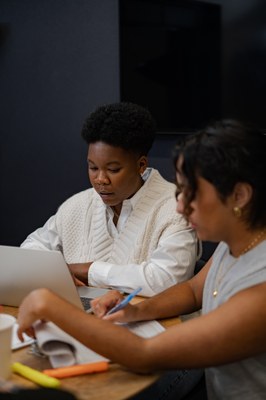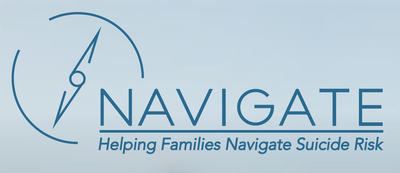Product Development

CFCWB has developed many products in collaboration with leading experts:
- CFCWB has partnered with leading suicidologist and Kent faculty member Dr. Laura Frey to develop a new evidence-informed training curriculum on family navigation of suicide risk called NAVIGATE. This curriculum is the culmination of much of Dr. Frey’s research, clinical expertise, and theoretical work in this important area and will be offered to professionals as a three day training with certification as a NAVIGATE provider.

- CFCWB partnered with Dr. Maurice Gattis and the Louisville Metro Department of Public Health to develop a web-based resource directory for the LGBTQ community in Louisville. This multi-stage research driven resource development project included a community needs assessment survey, focus groups with clients/parents/providers, and provider survey of LGBTQ supportive criteria.
- CFCWB developed a series of program on coping with COVID and transitioning back from COVID to address the stress and mental health impacts of the pandemic for a variety of audiences, including faculty, staff, and students at the University level, teachers, families, and students in early education settings.
- CFCWB developed an anti-separatism program that included macro and micro strategies for change, historical and cultural context of separatism that can be delivered to a variety of professional audiences, as well as students.
- CFCWB developed a comprehensive adversity informed care training program for organizations that included organization-wide, leadership, supervisor, and staff training in adversity informed care principles.
- CFCWB partnered with Moxie Girl to develop web-based content on mental health for adolescents.
- CFCWB partnered with University of South Florida to develop web-based content on mental health for students to manage stress and health issues such as anxiety and depression.
Learn about some of our product development projects:
The University of Louisville Human Trafficking Research Initiative (HTRI) in partnership with the Center for Family and Community Well-Being (CFCW) will deliver evidence-based professional training on six total specialized topics, as requested by the National Children’s Alliance. The training sessions will be delivered by master-level trainers via a CAC Forensic Resilience Training Academy series. Training topics include: Key project deliverables include: The Center for Family and Community Well-Being partnered with the Center for TRC to develop a participant workbook to accompany their trainings.Forensic Resilience Training Academy (FRTA) Manual Development
Partnering with community organizations to provide evidence-based programming materials for forensic professionals to foster resilience.
1. Mitigating Compassion Fatigue: Theory & Practice for Self Preservation and Team Care
2. Adversity-informed Identification and Screening of Victims of CP and HT
3. Adversity-informed Response and adversity-specific Services for Victims of CP
4. Working with Adolescents in Cases of Youth-produced Sexual Image(s)
5. Specialized Forensic Training for Interviewing those who have suffered from CP and HT
6. Developing an Adversity-Informed Community Response to CP and HT
• Development of the Forensic Resilience Training Academy (FRTA) curriculum
• Coordination and facilitation of the 6 training modules (2 sessions each; 2 hours each, the majority of the sessions will be delivered remotely) plus two 2-hour coaching/embedding sessions
• Development of a FRTA training manual for participants
• A brief research and evaluation report summarizing the impact and outcomes of the Forensic Resilience Training Academy (summary of survey results and interview themes)Moxie Girl Mental Health Programming Development
Development of online mental health content for Moxie Girls. Moxie Inc offers mentoring, goal setting, and mental health support to girls. The CFCWB proposes to partner with Moxie Inc for the following deliverables: Development of an Evidence-Informed Mental Health Program for Student Athletes
Evidence-informed mental health program on mental health for student athletes. The Center for Family and Community Well-Being developed an evidence-informed mental health program on mental health for student athletes. The COVID-19 pandemic has resulted in a significant increase in student athlete distress and mental health issues. While the NCAA and others have identified the need for comprehensive screening and services, there are low rates of implementation and a significant gap in the existing evidence-based or evidence-informed mental health programs are not specific to the population of student athletes. This project used a participatory action research approach to pilot, solicit feedback from athletes and develop customized program, implement and evaluate effectiveness of a psychoeducation program on mental health for student athletes. TRC Participant Workbook
Partnering with community organizations to provide evidence-based programming materials for fostering resilience.
